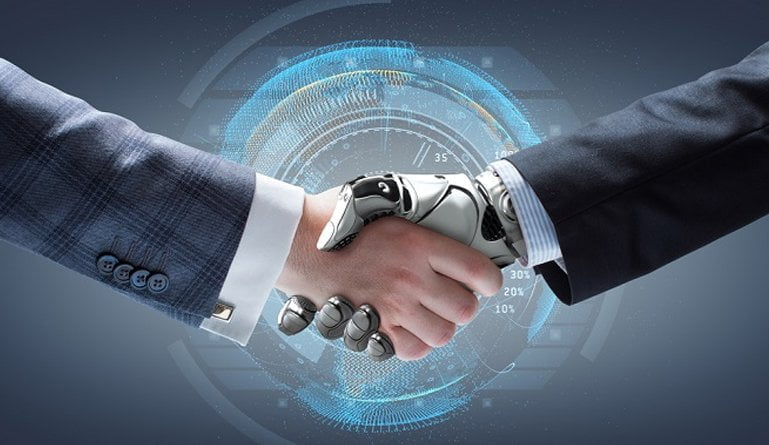Technology is changing the way that we do business, whether business owners like it or not! As we see changes in the use of Artificial Intelligence (AI), business leaders are adapting to stay competitive in their industry.
Artificial Intelligence is a concept that scientists have been studying since the 1950s, but there hadn’t been drastic advancements until the most recent wave of interest called Deep Learning. Many business owners and managers find themselves wondering how it works, and what the impact will be across their industry.
What is Artificial Intelligence?
Artificial Intelligence (AI) is machines, specifically computer systems, simulating human intelligence. Essentially, machines learn rules, reasoning and self-correction in order to make algorithms that can perform a variety of functions.
Two well-known subsets of AI include Machine Learning and Deep Learning
Machine Learning
The definition of machine learning is: “algorithms that parse data, learn from that data, and then apply what they’ve learned to make informed decisions.” This is done through math and complex coding. When something is capable of machine learning, it means that it’s performing a function with a given set of data, and gets progressively better at that function.
As an example, an on-demand music streaming service recommends new songs or artists based on machine learning algorithms. They associate the listener’s preferences with other listeners who have similar musical preferences.
Deep Learning
Deep learning is a subset of machine learning. Machine learning improves its function over time, but usually still requires some human guidance. Deep learning algorithms can determine on their own if a prediction is accurate or not.
For example, a machine learning algorithm could know to turn on a light if it hears the world “dark”. With deep learning algorithms, the light could turn on if it detects similar phrases, even if they don’t include the word dark. For example, if someone says a phrase like “I can’t see,” the algorithm would recognize the similarity in meaning and turn on the light.
Five ways that Artificial Intelligence will impact business

1. Improve CRM systems
A customer relationship management (CRM) tool allows businesses of all sizes to organize, automate and synchronize all aspects of a customer interaction. An organization’s sales, marketing, and customer support team typically use CRMs. Often, CRMs need a large amount of human interaction to keep the database updated.
AI applied to a CRM helps the database become self-updating, automating a variety of processes and adding contacts to the correct list without a human dedicating any time or energy. This allows the organization to stay on top of the relationship and better serve their clients.
2. Customer relations
Artificial Intelligence is changing the way that organizations connect and interact with their customers. One way that companies are leveraging AI to improve their customer relationships is through the use of chatbots. This is a computer program that communicates with humans through the Internet by using voice command and messages. A chatbot allows an organization to respond promptly to a customer inquiry, and directs them to the right spot of a website or to an employee to meet their needs.
AI can also be used to understand customer sentiments about certain products and an organization. This eliminates the human bias as there is no need to decipher the tone of voice of your customer. Lastly, AI provides a large amount of data to organizations about their customers’ interests, preferences and opinions. AI gives organizations the ability to offer related products and services based on a purchase to the correct customer at the correct time, increasing overall sales.
3. The organization of data
Data is everything in business. Organizations continue to collect large amounts of data, and businesses are using AI to sort and segment it all. Through Natural Language Processing and Machine Learning, AI has the ability to provide the sentiment of that data it is sorting through. Lastly, it can rate how credible the source of the data is. These advantages provide businesses further insight into their customers, competitors and their industry’s marketplace, allowing leaders to make educated, data-driven decisions.

4. Improve supply chain & reduce costs
Organizations have seen improvements in their supply chain by leveraging AI. Implementing automated processes can improve the agility and accuracy of the supply chain when compared to a manual process. Concepts such as inventory drones and driverless machines in supply warehouses have decreased errors, improved timing and lowered overall costs. The improved analytics that go along with AI technology allow decision makers to identify gaps within their supply chain and find solutions to improve overall efficiency.
5. Change organizational roles
Technology taking over jobs that humans are currently performing has always been a fear. Some say that jobs will be lost due to the Artificial Intelligence, but others say AI will create job opportunities. Most people believe that both will be true. Jeff Wong, EY Global Chief Innovation Officer, says: “With AI taking a leading role on tackling organizations’ simple and repetitive tasks, the human workforce can focus more on complex work that ultimately provides a greater level of professional fulfilment to employees and a more efficient use of critical thinking power.”
Human Resource and recruitment is one sector that many believe will change drastically due to the implementation of AI. It is expected that AI will replace 16% of jobs within the next decade. Organizations will find employees that are a better fit for their organization by assessing a candidate’s online presence and matching it to what they’re looking for. This data will also be sent directly to an employee’s inbox as it will be produced through the AI technology.
Looking to the future
At SupportMyMac, we know that the technology you use has a direct impact on your ability to serve your customers. We also recognize that it can be difficult to follow all the trends and know where to spend your time and money. Our technicians will take the time to understand your business, your goals and your overall workflow before recommending any changes or updates to your business technology. Every company will leverage technology in a different way in order to find success.
Related articles:
- How an IT Assessment Can Improve Your Productivity
- Top Benefits When You Outsource Your Business’ IT Support
- What is a Managed Service Provider?
